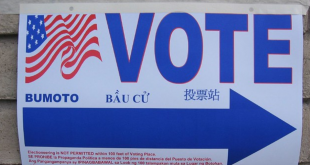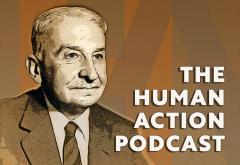Even if he loses, Donald Trump still has time to change military policy, pardon allies, unseat the Federal Reserve Board of Governors, and throw a wrench in the deep state apparatus. Original Article: “Here’s What Donald Trump Should Do Before Inauguration Day“. This Audio Mises Wire is generously sponsored by Christopher Condon. Narrated by Michael Stack. You Might Also Like The COVID Crisis Supercharged...
Read More »Curt Carlson on Innovation Champions
Key Takeaways and Actionable Insights Austrian economics sees an economy in motion, perpetually renewing itself. Economic agents (firms, customers, investors) constantly change their actions and strategies in response to outcome they mutually create. This further changes the outcome, which requires them to adjust afresh. Entrepreneurs live in a world where their beliefs and strategies are constantly being “tested” for survival within an outcome these beliefs and...
Read More »Election 2020: Choking on the Political Red and Blue Pills
Presidential election 2020 is the same as every other, except in the ways it isn’t. Allow me to expand on this. What is the same? The purpose of all elections is to allow a band of people called the state to legitimize their claim of control over everyone and everything within a given jurisdiction. In his book The Rise and Fall of Society, the Old Right libertarian Frank Chodorov defines the state as “a number of people who, having somehow got hold of it,” use “the...
Read More »Lockdowners and “the Desire to Dominate”
. In many years of lecturing at Mises University, Judge Napolitano has given the same—terrifying—ending to his introductory speech. Not until the horrors of this year did it dawn on me that perhaps his point has its basis in reality. The dear judge often mentions, almost like a joke, the libido dominandi—the desire to dominate, or the will to power, harking back to Augustine of Hippo’s centuries-old writing. We find similar notions in Friedrich Hayek’s “Why the Worst...
Read More »The Idea that Democracy Is the Same as Liberty Is a Weapon in the Hands of Despots
As Americans approach a date with their polling places and “get out the vote” campaigns crescendo, there is plenty of rhetoric that all but deifies democracy. Unfortunately, while democratically determining who will be entrusted with the reins of government may generally represent the best hope to enable governments to change without bloodshed (exemplified by John Adams just going home when he lost the presidency to Thomas Jefferson), democracy is not the defining...
Read More »Why Socialism Won’t End Worker “Exploitation”
A belief still commonly held today by not just Marxists and socialists, but progressives of many stripes, is the insistence that employers are “stealing” part of their workers’ labor because the wage workers receive from their employer are less than the contribution of their labor to the final value (i.e., selling price) of the finished good. Profit to the employer, the argument goes, is akin to theft from the workers. Profit is “surplus value” created by the...
Read More »The Benefits of Secession Are Becoming Increasingly Obvious
“Countries threaten to split apart when their people seem hopelessly divided…. We’re less united today than we’ve been at any time since the Civil War.” This Audio Mises Wire is generously sponsored by Christopher Condon. Narrated by Michael Stack. Original Article: “The Benefits of Secession Are Becoming Increasingly Obvious“. You Might Also Like The Disastrous Legacy of Woodrow Wilson [unable to...
Read More »Why Threats of Election Violence May Be Here to Stay
Both private sector businesses and police departments believe there is a good chance there will be postelection unrest. Both groups are taking steps to protect themselves in case of riots. Some left-wing protest groups state they plan to do “whatever it takes” to make sure the correct candidate—i.e., Joe Biden—wins. The National Guard has mobilized in several states in anticipation of riots. It remains to be seen if this apocalyptic rhetoric proves to be well...
Read More »Socialists Have Never Shown How They Could Increase the Standard of Living
[A selection from Nation, State, and Economy. Editor’s note: When Mises refers to “liberals” or “liberalism” he means the ideology of laissez-faire, sometimes now called “classical liberalism.”] Marxism sees the coming of socialism as an inescapable necessity. Even if one were willing to grant the correctness of this opinion, one still would by no means be bound to embrace socialism. It may be that despite everything we cannot escape socialism, yet whoever considers...
Read More »Jeff Deist on Hoppe’s Democracy: The God That Failed
Why don’t elections bring harmony and closure rather than ever greater political friction? Hans-Hermann Hoppe explained all of the fundamental problems with mass democracy more than 20 years ago in Democracy: The God That Failed. Jeff Deist finishes his series on this devastating classic with a look at Hoppe’s final chapters, critiquing conservatism, liberalism, and constitutionalism. Why do both conservatism and liberalism fail? (hint: democratic mechanisms)....
Read More » Swiss Economicblogs.org
Swiss Economicblogs.org









